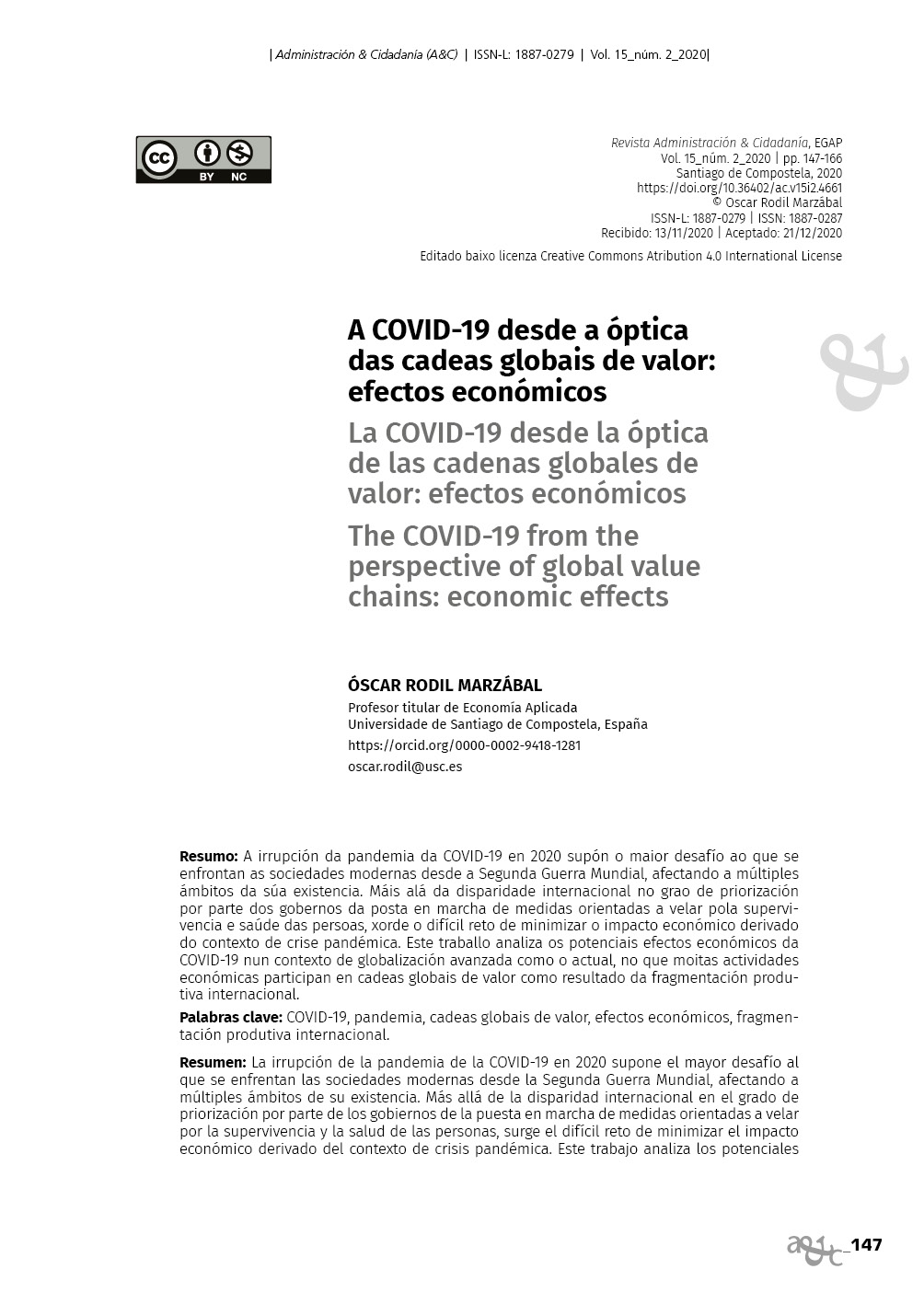The The COVID-19 from the perspective of global value chains: effects and implications
Main Article Content
The emergence of the COVID-19 pandemic in 2020 is the main challenge faced by modern societies since the Second World War, affecting many areas of their existence. Beyond the international disparity in the degree of prioritisation by governments of the implementation of measures aimed at ensuring the survival and health of people, there is a difficult challenge to minimise the economic impact derived from the context of the pandemic crisis. This paper analyses the effects and implications of the COVID-19 in the context of advanced globalisation, in which many economic activities are involved in global value chains because of international fragmentation of production.
Article Details
Abe, M. e Ye, L. 2013. «Building Resilient Supply Chains against Natural Disasters: The Cases of Japan and Thailand», en Global Business Review, 14(4): 567-586. https://doi.org/10.1177/0972150913501606.
Arndt, S.W. e Kierzkowski, H. 2001. Fragmentation: new production patterns in the world economy. Oxford: Oxford University Press.
Baldwin, R. 2013. «Global supply chains: why they emerged, why they matter, and where they are going», en D. Elms e P. Low (eds.), Global value chains in a changing world. Geneva: World Trade Organization / Fung Global Institute / Temasek Foundation Centre for Trade & Negotiations. https://doi.org/10.30875/0b68ab34-en.
Campos, H. e Rodil, O. 2020. «Sectoral impacts of the activity standstill due to external shocks such as COVID-19: An approach based on the hypothetical extraction applied to the external insertion of the Spanish economy», en Revista de Economía Mundial, 56 (Special Issue: COVID-19 and World Economy. Preliminary analysis).
CEPAL. 2020. «Los efectos del COVID-19 en el comercio internacional y la logística», en Informe Especial COVID-19, 6, 6 de agosto de 2020 (dispoñible en: https://repositorio.cepal.org/bitstream/handle/11362/45877/1/S2000497_es.pdf).
Gereffi, G. 1994. «The Organization of Buyer-Driven Global Commodity Chains: How U.S. Retailers Shape Overseas Production Networks», en G. Gereffi e M. Korzeniewicz (eds.), Commodity Chains and Global Capitalism. Westport, Connecticut London: Praeger.
Hopkins, T.K. e Wallerstein, I. 1977. «Patterns of Development of the Modern World-System», en Review (Fernand Braudel Center), 1(2): 111-145.
Hopkins, T.K. e Wallerstein, I. 1986. «Commodity Chains in the World-Economy Prior to 1800», en Review (Fernand Braudel Center), 10(1): 157-170.
Humphrey, J. e Schmitz, H. 2002. «How does insertion in global value chains affect upgrading in industrial clusters?», en Regional Studies, 36(9): 1017-1027. https://doi.org/10.1080/0034340022000022198.
Koopman, R., Powers, W., Wang, Z. e Wei, S-J. 2010. «Give credit where credit is due: Tracing value added in global production chains», en Working Paper, 16426. https://doi.org/10.3386/w16426.
Lampón, J.F., Lago-Peñas, S. e González-Benito, J. 2015. «International relocation and production geography in the European automobile components sector: The case of Spain», en International Journal of Production Research, 53(5): 1409-1424. https://doi.org/10.1080/00207543.2014.942757.
Shih, S. 1992. Empowering technology – making your life easier. New Taipei: Acer.
Wang, Z., Wei, S-J., Yu, X. e Zhu, K. 2017. «Measures of Participation in GlobalValue Chains and Global Business Cycles», NBER Working Paper, 23222. https://doi.org/10.3386/w23222.
World Bank e World Trade Organization. 2019. Global Value Chain Development Report 2019: Technological Innovation, Supply Chain Trade, and Workers in a Globalized World (English). Washington, D.C.: World Bank Group (dispoñible en: http://documents.worldbank.org/curated/en/384161555079173489/Global-Value-Chain-Development-Report-2019-Technological-Innovation-Supply-Chain-Trade-and-Workers-in-a-Globalized-World).
World Trade Organization. 2020a. «El comercio da muestras de reactivarse tras los efectos de la COVID-19, pero la recuperación sigue siendo incierta», en PRESS862 Comunicado de prensa, 6 de outubro de 2020 (dispoñible en: https://www.wto.int/spanish/news_s/pres20_s/pr862_s.htm)
World Trade Organization. 2020b. «El comercio de servicios cae un 30 % en el segundo trimestre mientras la COVID-19 hace estragos en el sector de los viajes internacionales», en Noticias, 23 de outubro 2020 (dispoñible en: https://www.wto.org/spanish/news_s/news20_s/serv_22oct20_s.htm).

